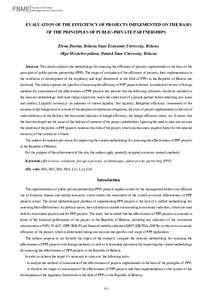Please use this identifier to cite or link to this item:
https://elib.psu.by/handle/123456789/27696Full metadata record
| DC Field | Value | Language |
|---|---|---|
| dc.contributor.author | Dorina, E. | - |
| dc.contributor.author | Meshcheryakova, O. | - |
| dc.date.accessioned | 2021-08-17T11:46:34Z | - |
| dc.date.available | 2021-08-17T11:46:34Z | - |
| dc.date.issued | 2017 | - |
| dc.identifier.citation | Dorina E., Meshcheryakova O. (2017) EVALUATION OF THE EFFICIENCY OF PROJECTS IMPLEMENTED ON THE BASIS OF THE PRINCIPLES OF PUBLIC-PRIVATE PARTNERSHIPS. New Challenges of Economic and Business Development – 2017: Digital Economy : Abstracts of Reports (9th International Scientific Conference; May 18-20 2017, Riga, University of Latvia) , pp. 152–163. | ru_RU |
| dc.identifier.uri | https://elib.psu.by/handle/123456789/27696 | - |
| dc.description.abstract | This article analyzes the methodology for assessing the efficiency of projects implemented on the basis of the principles of public-private partnership (PPP). The stages of evaluation of the efficiency of projects, their implementation in the conditions of development of the regulatory and legal framework in the field of PPPs in the Republic of Belarus are disclosed. The article explores the specifics of assessing the efficiency of PPP projects abroad. An analytical review of foreign methods for assessment of the effectiveness of PPP projects has showed that the following indicators should be included in the national methodology: debt load (helps objectively assess the credit load of a private partner before attracting new loans and credits); Liquidity (solvency): an indicator of current liquidity, fast liquidity; Budgetary efficiency: assessment of the increase in the budget load as a result of the adoption of additional obligations, the risks of project implementation (the risk of underutilization of the facility), the discounted indicator of budget efficiency, the budget efficiency index, etc. It seems that the least developed are the issues of the balance of interests of the project stakeholders. Ignoring the need to take into account the interests of the parties in PPP projects increases the risks of the project, which can become a negative factor for the national economy of the country as a whole. The authors formulated provisions for improving the current methodology for assessing the effectiveness of PPP projects in the Republic of Belarus. For the purpose of the achievement of the aim, the authors apply generally accepted economic research methods. | ru_RU |
| dc.language.iso | en | ru_RU |
| dc.publisher | University of Latvia | - |
| dc.subject | effectiveness | ru_RU |
| dc.subject | evaluation | ru_RU |
| dc.subject | foreign experience | ru_RU |
| dc.subject | methodologies | ru_RU |
| dc.subject | public-private partnership (PPP) | ru_RU |
| dc.title | Evaluation of the efficiency of projects implemented on the basis of the principles of public-private partnerships | ru_RU |
| dc.type | Article | ru_RU |
| Appears in Collections: | Публикации в Scopus и Web of Science | |
Files in This Item:
| File | Description | Size | Format | |
|---|---|---|---|---|
| Meshcheryakova.pdf.pdf | 629.47 kB | Adobe PDF |  View/Open |
Items in DSpace are protected by copyright, with all rights reserved, unless otherwise indicated.